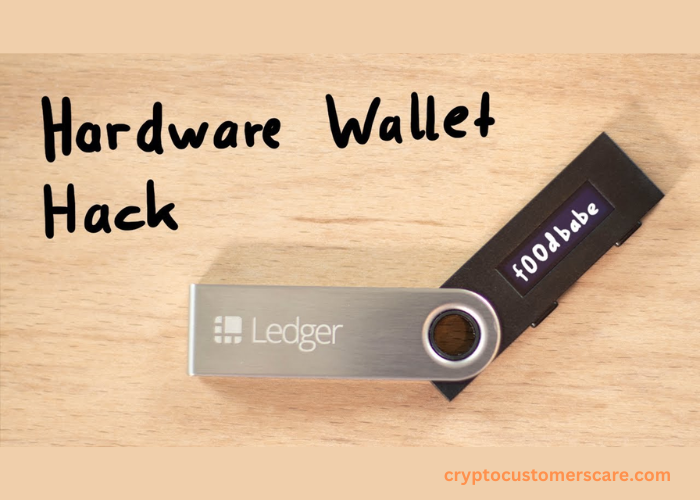Ledger hardware wallets have gained popularity among cryptocurrency enthusiasts due to their robust security features. These wallets provide a secure offline storage solution for storing private keys and conducting transactions. However, recent events have raised concerns about the safety of these hardware wallets. In this article, we will delve into what it means for a hardware wallet to be hacked and explore the implications of the recent Ledger hardware wallet hack.
What Does It Mean for a Hardware Wallet To Be Hacked?
When we talk about a hardware wallet being hacked, it means that unauthorized individuals have gained access to the private keys stored within the device. Private keys are crucial for accessing and transferring cryptocurrencies. If someone gains access to these keys, they can potentially steal your funds or manipulate your transactions. Therefore, the security of hardware wallets is of utmost importance for cryptocurrency holders.
Overview of the Ledger Hardware Wallet Hack
In July 2020, Ledger, one of the leading manufacturers of hardware wallets, suffered a data breach that exposed sensitive customer information. The breach compromised personal details, including names, email addresses, and phone numbers of approximately 270,000 customers. Although the breach did not directly compromise the private keys stored in the hardware wallets, it still raised concerns about the overall security of Ledger devices.
Impact of the Hack on Ledger Wallet Users
The Ledger hardware wallet hack has had significant ramifications for its users. The leaked customer information can be used for phishing attacks, where scammers pose as Ledger representatives to trick users into revealing their private keys.
This puts users’ funds at risk. Moreover, the breach has created a sense of distrust among Ledger customers, who now question the security of their devices. Many users have resorted to transferring their funds to alternative wallets, which may have long-term implications for Ledger’s reputation and market position.
Steps To Take if Your Ledger Hardware Wallet Is Hacked
If you suspect that your Ledger hardware wallet has been compromised, it is crucial to take immediate action to protect your funds. Firstly, disconnect the device from any internet-connected devices to prevent further unauthorized access. Then, contact Ledger’s customer support to report the incident and seek guidance on securing your wallet.
It is also advisable to monitor your accounts for any suspicious activities and consider changing your passwords and recovery phrases. Additionally, be cautious of phishing attempts and never share your private keys or recovery phrases with anyone.
Preventing Future Hacks: Best Practices for Securing Your Ledger Hardware Wallet
While the recent Ledger hardware wallet hack has raised concerns, there are steps you can take to enhance the security of your device and protect your funds. Firstly, ensure that you purchase your hardware wallet directly from the official Ledger website or authorized resellers to minimize the risk of tampered devices.
It is also essential to keep your wallet’s firmware up to date, as manufacturers often release security patches and bug fixes. Additionally, enable the PIN code feature on your device and choose a strong, unique PIN that is not easily guessable. Lastly, consider using a passphrase in conjunction with your hardware wallet for an added layer of security.
Alternatives to Ledger Hardware Wallets
If you have lost trust in Ledger hardware wallets due to the recent hack or simply seek alternative options, there are several other reputable hardware wallet manufacturers to consider. Trezor and KeepKey are two popular alternatives that offer similar security features.
These wallets have their own strengths and weaknesses, so it is advisable to research and choose the one that best fits your needs. Remember to purchase from official sources and follow best practices to ensure the security of your funds.
Response From Ledger and the Cryptocurrency Community
Following the hack, Ledger took immediate action to address the breach and strengthen their security measures. They provided regular updates to their customers, urging them to remain vigilant and take necessary precautions.
The cryptocurrency community also rallied around the affected Ledger users, providing support and advice on securing their funds. This incident serves as a reminder of the importance of collaboration between hardware wallet manufacturers and the community to maintain the integrity of the cryptocurrency ecosystem.
Lessons Learned From the Ledger Hardware Wallet Hack
The Ledger hardware wallet hack has highlighted several crucial lessons for both hardware wallet manufacturers and cryptocurrency users. Firstly, manufacturers must prioritize the security of their devices and regularly assess and update their security protocols.
Transparency and timely disclosure of any breaches or vulnerabilities are also essential to maintain trust in the community. For users, it is vital to remain informed about security best practices, exercise caution when dealing with sensitive information, and be proactive in securing their funds.
Conclusion
The recent Ledger hardware wallet hack has shaken the cryptocurrency community and emphasized the importance of robust security measures. While no system is entirely foolproof, taking necessary precautions can significantly reduce the risk of falling victim to such attacks. By following best practices, staying informed, and remaining vigilant, you can enhance the security of your Ledger hardware wallet and protect your valuable cryptocurrency holdings. Remember, the responsibility lies with both hardware wallet manufacturers and users to ensure the integrity of the ecosystem.







